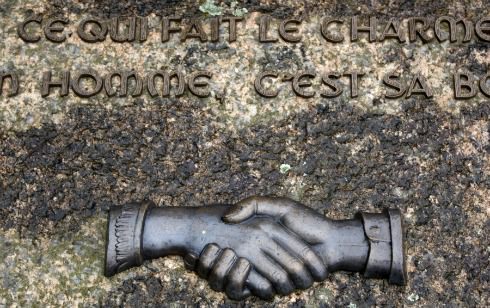 Everyone wants peace. But equally, most people find conflict more interesting than peace. Compare the number and the relative success of television series that trade in war and violence with those that describe a serene peace. Yet almost always wars are fought to secure peace – on the right terms. Enemies are attacked so that they will be driven to negotiate peace. That was true for the ancient Romans. It is true for the powers now fighting in Syria and Iraq. In our daily lives, too, peace is something we value and seek both in our own lives and in our close relationships. Yet it is always a work in progress. We think longingly of peace and we find ourselves caught in inner turmoil, upset by people we think have disrespected us, panicked by the state of the household budget and our debts, or anxious about our work.
Everyone wants peace. But equally, most people find conflict more interesting than peace. Compare the number and the relative success of television series that trade in war and violence with those that describe a serene peace. Yet almost always wars are fought to secure peace – on the right terms. Enemies are attacked so that they will be driven to negotiate peace. That was true for the ancient Romans. It is true for the powers now fighting in Syria and Iraq. In our daily lives, too, peace is something we value and seek both in our own lives and in our close relationships. Yet it is always a work in progress. We think longingly of peace and we find ourselves caught in inner turmoil, upset by people we think have disrespected us, panicked by the state of the household budget and our debts, or anxious about our work.
In our families we long for peace, but our two-year-old rampages his way to get his own will, our adolescent daughter pushes all our buttons and tests all our boundaries, and even the Christmas dinner we had dreamed of as a harmonious event turns to sulks and recrimination.
These examples show us that peace is never a stable gift to be taken for granted. We must make peace and work to preserve and to restore it if it is broken. Jesus himself praises not the peaceable but those who make peace. For him, too, the way to peace is non-violence, the making of space in conflict, writing on the ground instead of confronting men with murder on their mind, giving himself up rather than fighting. The International Day of Non-violence reminds us that peace making and keeping is a constant challenge, and that it begins within us, reaches out to our homes and personal relationship and extends through groups and work places to nations.
Non-violence is a seamless robe, a way of seeing the world and of living within it. It demands attention to the movements of our own hearts and to the faces of others. It requires a discipline that allows us to respond to aggression by waiting and recognising the humanity of our aggressors. It runs counter to our natural instincts of flight or fight, to our natural desire for a quick resolution that takes away our fear. We wait instead with open hands and engage peaceably with the person or groups we see as a threat.
Of course there is always a tension between non-violence and our responsibilities to others. The wife of an addicted husband may have to consider her children in the way she responds to his violence, knowing that his humanity may be unreachable through the cloud of alcohol or drugs. In society and in international relationships, too, the challenge of responding to violence in non-violent ways is massive.
The fact that we are often caught in our necessities makes it the more important to honour people who consistently act non-violently–ambassadors who negotiate peaceful resolutions to fierce disputes, church leaders who pray publicly for the nation's dead enemies as well as their own, the conscientious objectors, peaceful breakers of unjust laws, leaders of peaceful demonstrations against war and so on. We may be impatient with them, particularly if we disagree with their cause, but they recall us to our business of being peacemakers.
Andrew Hamilton is a consulting editor at Jesuit Communications.
Photo: Quinn Dombrowski: Flickr CreativeCommons